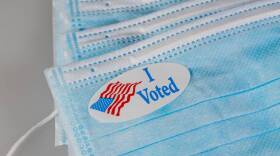
Brian Naylor
NPR News' Brian Naylor is a correspondent on the Washington Desk. In this role, he covers politics and federal agencies.
With more than 30 years of experience at NPR, Naylor has served as National Desk correspondent, White House correspondent, congressional correspondent, foreign correspondent, and newscaster during All Things Considered. He has filled in as host on many NPR programs, including Morning Edition, Weekend Edition, and Talk of the Nation.
During his NPR career, Naylor has covered many major world events, including political conventions, the Olympics, the White House, Congress, and the mid-Atlantic region. Naylor reported from Tokyo in the aftermath of the 2011 earthquake and tsunami, from New Orleans following the BP oil spill, and from West Virginia after the deadly explosion at the Upper Big Branch coal mine.
While covering the U.S. Congress in the mid-1990s, Naylor's reporting contributed to NPR's 1996 Alfred I. duPont-Columbia University Journalism Award for political reporting.
Before coming to NPR in 1982, Naylor worked at NPR Member Station WOSU in Columbus, Ohio, and at a commercial radio station in Maine.
He earned a Bachelor of Arts degree from the University of Maine.
-
President-elect Biden has begun work on getting his administration in place, but the Trump administration has yet to hand him the keys to begin the transition formally.
-
A federal judge ordered the U.S. Postal Service to sweep its facilities for any ballots in North Carolina and Pennsylvania amid reports of ballots left behind or delivered late in some states.
-
Millions of outstanding votes have yet to be tallied, including in the key states of Georgia, North Carolina and Pennsylvania.
-
The executive order strips protections for thousands of federal workers. The administration says it's needed to get rid of "poor performers," but critics call it an attack on nonpolitical employees.
-
As the election draws closer, a record number of Americans are voting early. So far, fears about delays in ballots being returned through the mail haven't materialized.
-
Democrats boycotted the vote, pointing to what they called the damage she would do to health care, and reproductive and voting rights, and the fact the vote took place amid the presidential election.
-
The U.S. Postal Service said it agreed to the settlement with Montana because "it has always been our goal to ensure that anyone who chooses to utilize the mail to vote can do so successfully."
-
Republicans are bringing supporters of Judge Barrett to testify, while Democrats call on advocates for issues they believe are threatened by Barrett's confirmation to the Supreme Court.
-
The ranking Democrat on the Senate Judiciary Committee says the Senate should put off the nomination until after the presidential election.
-
Thursday was the fourth and final day hearings for President Trump's nominee. Next up in the process is the committee vote on Oct. 22.
-
In Maine, polls show a close contest between Republican Sen. Susan Collins and Democrat Sara Gideon. One factor in determining the winner may be the state's ranked-choice voting system.
-
In a ceremony at the U.S. Capitol, Rabbi Lauren Holtzblatt says Supreme Court Justice Ruth Bader Ginsburg won equality "not in one swift victory, but brick by brick, case by case."








